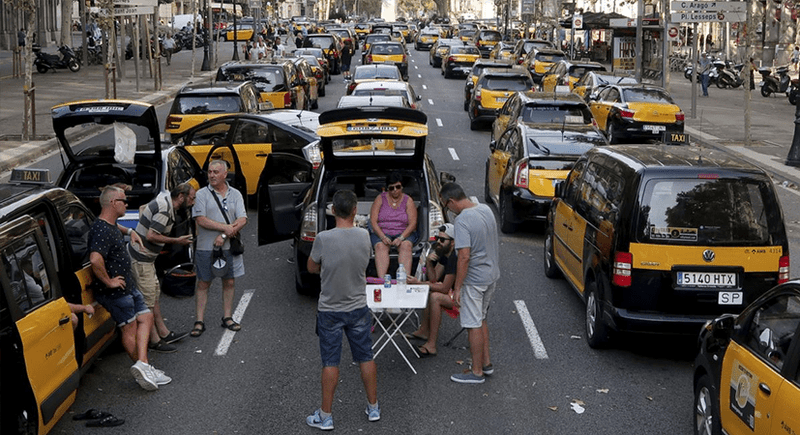Uber, Lyft, Grab, and many other taxi-hailing companies have often been a part of many controversies. Be it the protests from the traditional taxi driver’s associations, drivers of their own company, or the customers.

Taxi-hailing services and controversies go hand in hand. Recently, drivers in Barcelona declared an endless strike against the app-based taxi-hailing services.
The protest soon spread in the other parts of the country which includes the capital Madrid.
What triggered the protest?
To know the reason behind the protest we first need to understand the current scenario of various taxi companies operating in the country. In Spain, two types of taxis operate 1. Traditional taxis and 2. Private hire taxis (VTC licenses).
The drivers of the traditional taxis accuse that alternative cab service viz. Uber and Cabify are intruding in the cab sector and are getting away by paying low taxes.
The protesting drivers held VTC licenses responsible for providing advantage to these companies over traditional companies.
What is VTC? How is it different from traditional taxis?
VTC (Voiture de Tourisme avec chauffeur = chauffeur driven cars) is a license that offers private taxis to operate under certain guidelines.
VTC taxis and traditional taxis differ from each other in many ways. Let’s have a look at some of the key differences.
Fare:- VTC services offer fixed fares whereas traditional taxis offer no fixed fares.
Booking in advance:- VTC and traditional taxi services both allow advance booking, but traditional taxi services charge extra fees.
Wireless:- VTC services uses taxi booking apps for the reservation of rides. Whereas, the traditional taxis do not use any app-based services.
Personalized services:- VTC taxi services offer a great deal of personalized services as compared to traditional taxis. They offer guaranteed cleanliness and water bottles in their taxis.
How did the protest begin and spread?
18th Jan
The strike first began in Barcelona on 18th of Jan. A huge number of traditional taxi drivers revolted against the draft that regulates the VTC cab services.
According, to the new regulations imposed by Catalonia’s regional government the customers have to book VTC cabs like Uber or Cabify at least 15 minutes before the time they need it.
The traditional taxi drivers were against the new regulation as they believe that VTCs are not a taxi service by law.
And due to that the customers must book it 12 to 24 hours in advance. “We want them to differentiate both services and the only way to do so is via pre-booking,” said the head of the Taxi Union of Catalonia Luis Berbel to AFP.
“Fifteen minutes is nothing, it’s an insult to the sector.” He added.
21st Jan
Following the path of their counterparts in Barcelona, Taxi drivers in Madrid began their indefinite strike on the morning of 21st Jan.
Meanwhile the drivers’ strike in Barcelona entered its third day where they continued to block the central Gran Vía boulevard.
Apart from Barcelona and Madrid, the strike spread to other Catalan municipalities like Terrassa, Mataro’, and Sabadell.
23rd Jan
The strike continued on 23rd Jan in Barcelona and Madrid. However, the Catalan regional government came up with a new offer to end the strike.
The new offer increased the previously announced 15-minute margin to one hour. The drivers’ association in Barcelona took vote on this day whether to end the strike or not.
29th Jan
The strike continued on Tuesday in Madrid. The protestors reportedly approached towards the People’s Party headquarters via Genova street.
This lead to massive traffic disruptions. Meanwhile the protests from the drivers of app-based taxi hailing services also intensified as they were against the proposed 15-minute pre-booking rule stating it as unfair rule.
1st Feb
Responding to the government’s regulation, app-based ride-sharing services Uber and Cabify announced to end their services in Barcelona.
Cabify responded to the new regulation by saying that it would make their services unviable in Barcelona. On the other hand, the negotiations continued between the taxi associations and the government.
Read More: Why Taxi dispatch system is a must for traditional taxi services
5th Feb
Finally, on 5th February the taxi drivers in Madrid called off their strike. The decision came after drivers’ voting.
The taxi association said that the taxi services will start on February 6. Although, the taxi driver association said that they would continue protesting the app-based services.
Global scenario
If you think that this was a one-off thing in Spain then you’re wrong, as driver association all around the world are protesting the app-based taxi services.
SODA (Smart online driver’s association) is an umbrella body in Uganda that brings all the drivers of Uber and Taxify together.
The association is constantly demanding the app-based companies to increase the fare rate and cut-down on company’s commissions.
In South Korea, thousands of taxi drivers came on road to protest the introduction of an app-based taxi company by Kakao.
Drivers believed that Kakao’s taxi service would pose a great threat to their livelihood.
Similarly, there have been several instances of strikes by the cab drivers in India. The protests include drivers of both traditional services as well as the app-based services.
Traditional cab drivers demand tight regulation on app-based cab services, since they eat all their profits.
Whereas, drivers of app-based services like Uber and Ola find themselves in a miserable position after the company decreased their tariff rates and increased the commissions drastically.
What can cab drivers do?
It seems that the drivers of traditional taxi services and app-based services faces are facing trouble in every part of the world. But, is there anything that they can do?
The Sao Paulo City Hall might have come with a possible solution. To tackle the dominance of Uber in the country the Sao Paulo Mayor Joao Doria launched a taxi booking app called SP Taxi.
The app launched had a tremendous support of local traditional drivers. SP Taxi like other taxi-booking apps allows its drivers to provide lucrative offers to their customers.
Moreover, it allows customers to rate the driver and to pay their fare via card or cash.
The application has received tremendous response as more than 8000 drivers have signed up on the first of its launch. The app’s Android version has over 50,000 downloads while its iOS version has a rating of 109.
Conclusion
In this article, we saw how a strike started by cab drivers against the VTC drivers in Spain lasted for almost two weeks.
Along with causing unrest on the roads it put pressure on the local government to contemplate on their previous regulation draft.
The impact of the strike was such that it led Behemoths like Uber and Cabify discontinued their services in Barcelona.
Situation in Uganda, South Korea, and India clearly proves that the problem doesn’t only lie in Spain.
The incessant news of growing tension between the drivers and the app-based companies around the world clearly signals some massive changes in the future.
SP Taxi in Brazil does raise a hope of a possible solution to this conundrum. So, we shouldn’t be surprised if we see more taxi driver associations coming up with their own apps.
An app for the drivers and of the drivers give them immense authority to set up their fare rate, commissions, and other important policies.
Another possible solution to this problem could be a partnership between the driver’s association and a company that provides taxi dispatch solutions. Only the time will how the things go, till then we all can just watch.





